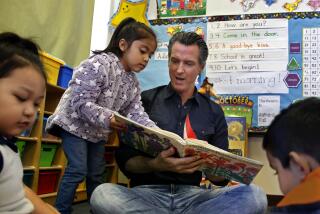Vouching for the Importance to All of Public Education
- Share via
The issue of school vouchers is resurfacing in the California Assembly. The voters expressed their opinion in November 1993, but the combination of real, unresolved problems in public education and special-interest groups seeking government handouts keep the issue alive.
My children go to Fountain Valley High and Masuda Middle schools. I am happy with the education they are receiving, but considering the quality of faculty and students and the level of parental support, I think that truly great things could happen if we could free the reins of our administrators and teachers.
While I agree that our public education system is in need of major repair, I disagree that education should be totally privatized via subsidies. My position on this subject is shaped by having gone back to Newt Gingrich’s “Reading List for America,” and by my mother’s experiences as a career teacher in both public and private schools.
Thomas Jefferson was the prime mover for public education in Colonial America. He believed that informed public opinion was the best guarantor of successful republican government, and that the two elements necessary for that were a free press and literacy for all. According to Jefferson, what we call K-12 would produce the literate public, and universities would produce our civic and political leaders. Only then, he said, could the common man govern.
Although it did not happen during his lifetime, Jefferson’s plan for Virginia included comprehensive public education. In the quarter-century after his death in 1826, it exploded in growth, not only in Virginia, but throughout the country. A major milestone was Thomas Mann’s appointment as the nation’s first state secretary of education in Massachusetts in 1837. Public education became so popular that demand quickly outstripped supply.
The concept of public education is as valid now as it was then. Today, America needs all youngsters to get an excellent education not only to guarantee a successful republic politically, but also compete economically in what the author Alvin Toffler calls the Third Wave information age. What has gone amok with public education is not Jefferson’s concept, but rather its application.
The voucher system is a short-term fix with a long-term downside. Within two generations of the implementation of vouchers, 25% of our youngsters will get excellent educations, and 75% will get second-rate ones. If only 25% of our children get excellent educations, the United States will slip into economic and social oblivion.
Private schools typically pay less than public schools. Right now the private schools can attract really dedicated teachers at lower salaries because of their greater focus on academics and classroom order. As the number of private schools expands, a point of diminishing returns will be reached as availability of dedicated, motivated teachers who are willing to work for less is depleted. Classroom order will decrease as administrators loosen standards for student behavior to keep classrooms filled as they try to sustain revenues in the face of increasing competition. By two generations, the current advantage that private schools have will have faded, and their quality will have slipped as they compete with both more private and existing public schools.
Second, as with other government give-away programs, the lure of easy money will attract charlatans and con artists to open schools.
A third point is the sophistical argument that voucher-financed “private” schools will better serve low-income areas than public schools currently do. Like public schools, parochial schools in Los Angeles have become veritable fortresses. Private schools will gravitate toward affluent suburbs just as other consumer-oriented businesses have.
Furthermore, being a private school does not assure excellence. While some excel, others have no better SAT and other performance results than do public schools with strong parental involvement. This is true of both secular and parochial private schools. Hence, the key indicator is not public vs. private, but the level of parental participation.
The American public is rightfully frustrated and angry with public education because we feel that it’s out of our control. But our anger should be at the establishment’s application, not Jefferson’s concept. If we correct the application, we obviate the need for vouchers.
In order to reform the education, everyone, from elected leaders to secretaries of education, boards of education, faculty and parents, needs to get involved. We need to disentangle public education from the social engineering and bureaucracies that have choked it for the last 30 years.
Administrators and teachers, as professionals, should be subject to the same performance criteria under which business professionals thrive. Current national and state educational codes hobble good administrators and shield the weak ones.
The protective web of civil service laws and union agreements need to be abolished to make the employees more responsive to the customer, i.e. parents and taxpayers. Tenure for K-12 teachers is outmoded, and needs to be eliminated.
To put private schools within the financial reach of most parents means letting them keep more of their paycheck. This involves reducing the aggregate tax burden from the current average of 40+% to around 25%. To do so requires reducing government spending at all levels, and implementing an equitable tax structure via either a flat tax or consumption tax.
If we were to put as much energy into reforming public education as is being expended on voucher issues, both public and private schools would be viable. If we have viable public and private educational systems, we will have both an informed public and parents with true and affordable choices. That’s a win-win-win situation for Jefferson’s concept of public education, parental right to an affordable choice and America’s future.
More to Read
Sign up for Essential California
The most important California stories and recommendations in your inbox every morning.
You may occasionally receive promotional content from the Los Angeles Times.













